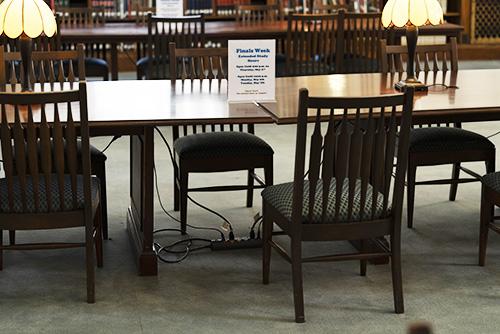Haley Penrod
Staff writer
hpenrod1@murraystate.edu
Murray State offers students resources to prepare for exams as finals week approaches.
Finals take place from May 4 to May 10. To help students before and during the week, the University provides counseling and tutoring services.
Angie Trzepacz, director of counseling services, provided tips for students to cope with stress and anxiety throughout the week.
“Some of the best coping techniques include focusing on self-care: make sure you eat healthy meals, allow yourself time to get enough sleep, schedule time for exercise, be sure to get some fresh air and sunshine, try to balance study time with relaxation time and schedule some time with friends,” Trzepacz said.
The counseling center is open during finals, and an on-call counselor is available from 9 a.m. to 3 p.m. Monday through Friday if students are in need of help.
Sarah Verive, tutoring coordinator for the Center for Academic Success, said tutoring is available to help students prepare for finals.
The Center for Academic Success offers tutoring Monday through Thursday from 2:30 p.m. to 5:30 p.m., depending on which subject is offered what day and time.
“Tutoring can help students not only by clarifying information that a student is confused about, but also by teaching students different ways to study and new study skills,” Verive said. “For example, in math, our tutors assist students with problems, but instead of giving them the answer, they try and teach the student how to come up with the answer so they can figure it out on their own during an exam.”
Tutoring services are free for students and no appointments are required. However, May 3 is the last day tutoring is offered.
“All you have to do is check which day and time the class you need assistance with is offered and just show up,” Verive said. “You can come by just once or as many times as you need. Our tutors are all Murray State students, so they understand how stressful finals can be, and they bring that understanding to each session.”
Brian Martin, tutor from Ajax, Ontario, said he recommends making a study schedule for finals week.
“Estimate the amount of time you need to study for each course, set aside time during the day to reach those goals, and make sure you adhere to it,” Martin said. “This should help avoid frantic, late night studying that will cut into sleeping. When it comes to tutoring, don’t leave it until the last minute. Come early in the week to have your questions addressed, leaving you plenty of time to practice and review afterwards.”
Shauna Mullins, director of the Center for Academic Success, said when preparing for finals, it is important to study in a manner that works for you.
“If you need total quiet, then you might want to find a quiet space in the library,” Mullins said. “If you study better with someone, form a study group. Just remember to stay on task. Making notecards and rewriting notes also helps when studying for an exam.”
Professors are also resources students can use if they are not comfortable with material covered in class.
Michelle Casey, assistant professor in the department of earth and environmental science, said study groups are the best way to study.
“Other students can help fill in gaps in your notes or your understanding,” Casey said. “Even helping other students by explaining a concept you understand to them is a great way to study. You are way more likely to remember something you’ve taught than something you’ve only heard. Students that form a study group show significantly higher exam scores and final grades than students that do not.”
Gina Claywell, professor of English, said students should start studying now to get a grasp on the cumulative knowledge of the class.
“Prioritize the work you need to get done, and then allocate a specific amount of time for each final,” Claywell said. “I recommend you limit your access to social media and other activities that lend themselves to procrastination.”
Claywell also said studying for your finals early can result in less stress and less procrastination.
“Finals week is just another hoop to jump through toward reaching your academic and career goals,” Claywell said. “Approach it with common sense and stubborn persistence, and you’ll succeed.”




























































































